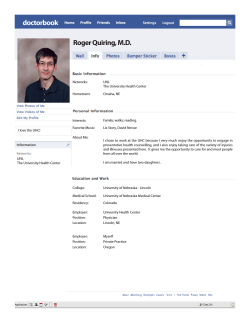
- Nebraska Business Development Center
PUBLICATION OF THE NEBRASKA BUSINESS DEVELOPMENT CENTER Why good financial records are worth the effort The importance of good financial records reaches beyond financial and tax reporting. A ccounting. Taxes. Payroll. Record keeping. Necessary, but confusing at times. Thorough and accurate record-keeping of all revenues and expenses related to your business is essential. The first step is to open a new bank account specifically for your business. This account will help you to keep personal finances separate from business expenses. Step two—keep all of your business receipts and create a filing system. One thing to bear in mind, receipts are commonly printed on laser paper and wear away in a short amount of time. Consider scanning these documents into your computer or making a copy of the receipt to ensure the documents are legible come tax time. Don’t try to be everything to your business On several occasions I have worked with businesses that have elected to do their own bookwork. I review their financial statements and find the documents riddled with errors: expenses that are listed in inappropriate accounts, misreporting of revenue or no reporting at all, incorrect classification of short term and long term liabilities, and the list goes on. Many owners do their own books to save money. They shouldn’t. They aren’t fool proof While QuickBooks and other bookkeeping software are very useful, they are not fool proof. If you are not well-versed in bookkeeping or excited about accounting, don’t try to do it yourself. Invest in the services of a bookkeeper or accountant—especially if you have employees. Owners have a higher skill set. You have a passion for the service you provide or the sale of your products. Focus your energy on increasing sales and marketing your business, and leave the accounting to the pros. The importance of good financial records reaches beyond financial and tax reporting. Suppose you go to a bank and ask for an operating Focus your energy loan because your business is growing on increasing sales and you can’t keep and marketing your enough working business, and leave the capital in your business to support accounting to the pros nbdc.unomaha.edu1 PUBLICATION OF THE NEBRASKA BUSINESS DEVELOPMENT CENTER its growth. The lender will want to see, at a minimum, the last three years of financial statements from your business. Thanks to poor bookkeeping practices and mixing personal expenses with business accounts, your financial statements show a trend of negative growth and minimal net income. The loan is denied because your records do not support what you are suggesting. To have lending success, your financials must be cleaned up and demonstrate your business’s true performance. When you’re ready to sell Another circumstance when good financial reporting is important is when you are ready to sell your business. Prospective buyers want to know about your historical financial performance and if this is a business they should invest in. If the information presented demonstrates a questionable trend in annual revenue or aggressive expensing they may be hesitant to buy your business. In their minds, uncertainty equates to risk. Your story must match your financial information. Thorough and accurate financial records can be difficult to develop on your own. Do what you can to prepare the financial information and find a trusted advisor to help you with the rest. Now…back to doing what you do best…running your business. About the author Sara McMIllan is a business consultant for the Nebraska Business Development Center. She has completed her Economic Development Finance Professional certification from the National Development Council and has obtained the CVA, CEPA and CBPA credentials in business valuation and transition planning. In 2014, she was recognized by the Association of Small Business Development Centers as the State Star for Nebraska. About the Nebraska Business Development Center NBDC is a cooperative program of the U.S. Small Business Administration (SBA) and the College of Business Administration at the University of Nebraska at Omaha (UNO). NBDC partners with the University of Nebraska at Kearney, Southeast Community College, Wayne State College, Mid-Plains Community College and Chadron State College to provide consulting and business support services from offices in Omaha, Lincoln, Kearney, Grand Island, North Platte, Wayne, Auburn, Scottsbluff and Chadron. Learn more about NBDC at nbdc.unomaha.edu © 2015 Nebraska Business Development Center Permission is given for reproduction of this whitepaper in whole or in part, provided that the copyright notice is preserved and that the author and the Nebraska Business Development Center are acknowledged nbdc.unomaha.edu2
© Copyright 2025

















